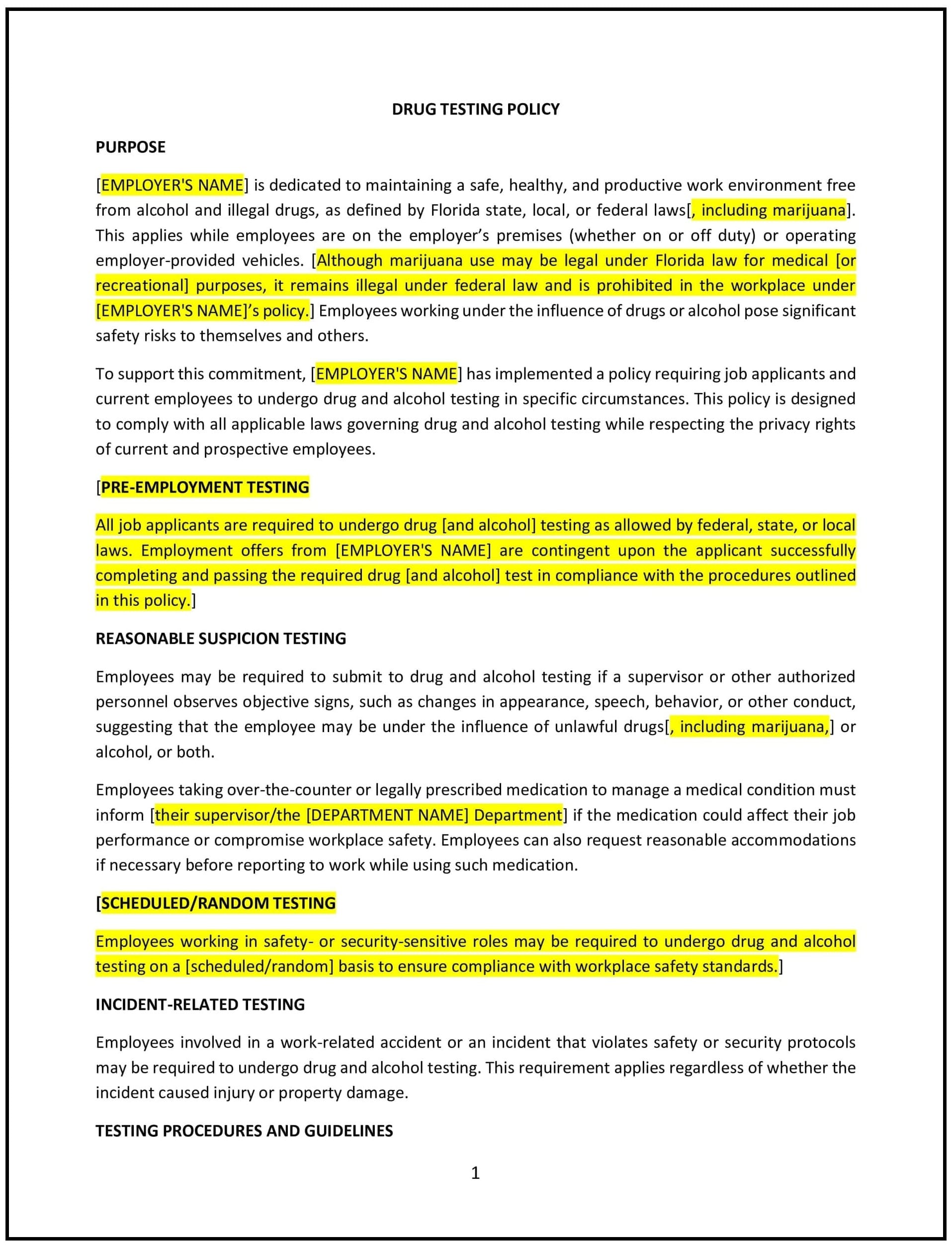Got contracts to review? While you're here for policies, let Cobrief make contract review effortless—start your free review now.

Customize this template for free
Drug testing policy (Florida)
A drug testing policy helps Florida businesses maintain a safe, productive, and compliant workplace by outlining the procedures for testing employees for drug and alcohol use. This policy specifies when and how drug testing will be conducted, the types of tests that may be used (e.g., pre-employment, random, post-accident), and the consequences for employees who test positive or refuse to take a drug test. It also defines the rights of employees and ensures compliance with relevant Florida laws and federal regulations.
By implementing this policy, businesses can reduce workplace accidents, ensure compliance with legal requirements, and create a healthier, safer environment for all employees.
How to use this drug testing policy (Florida)
- Define testing circumstances: Specify when drug testing will be required, such as during pre-employment, random testing, after workplace accidents, or when there is reasonable suspicion of drug use. The policy should outline the conditions under which each type of test will be administered.
- Set testing procedures: Clearly outline the process for drug testing, including the selection of testing facilities, the method of testing (e.g., urine, saliva, hair), and the process for handling and storing samples to ensure accuracy and confidentiality.
- Address employee consent: Explain that employees must consent to drug testing as a condition of employment, and provide information on how employees can withdraw consent, if applicable, and the potential consequences of doing so.
- Define drug-free expectations: Emphasize that the policy is intended to ensure that employees are not under the influence of drugs or alcohol while performing their job duties. Specify what substances are prohibited and set clear standards for acceptable behavior.
- Handle positive results: Outline the steps to be taken when an employee tests positive for drugs, including possible disciplinary actions, such as counseling, suspension, or termination. The policy should also specify if an employee will be given a chance to contest or explain the results.
- Provide information about support programs: Offer employees resources such as an employee assistance program (EAP) or support for those seeking treatment for substance abuse, reinforcing that the company is committed to supporting employees' health and well-being.
- Ensure compliance with the law: Make sure the policy complies with relevant Florida state laws, federal regulations (e.g., the Americans with Disabilities Act, Occupational Safety and Health Administration guidelines), and industry-specific standards regarding drug testing and substance use in the workplace.
Benefits of using this drug testing policy (Florida)
This policy offers several benefits for Florida businesses:
- Ensures workplace safety: Drug testing helps identify employees who may be under the influence of substances that could impair their performance, reducing the risk of accidents and injuries in the workplace.
- Promotes productivity: By maintaining a drug-free workplace, businesses can ensure that employees are focused, efficient, and performing at their best, leading to increased productivity and reduced absenteeism.
- Ensures legal compliance: A clear drug testing policy helps businesses comply with federal and state laws regarding drug testing, substance abuse, and employee rights, reducing the risk of lawsuits or legal issues.
- Protects the company’s reputation: A drug-free workplace demonstrates a commitment to safety and professionalism, enhancing the company’s reputation with employees, clients, and the public.
- Supports employee health and well-being: The policy can also offer resources for employees who need help with substance abuse issues, showing that the company cares about their health and providing avenues for support and treatment.
Tips for using this drug testing policy (Florida)
- Communicate the policy clearly: Ensure that all employees are aware of the drug testing policy, the types of testing they may be subject to, and the consequences for non-compliance. The policy should be easily accessible to all employees.
- Provide training: Offer training for supervisors and managers on how to identify signs of substance abuse, handle drug testing procedures, and address issues related to drug use in the workplace.
- Implement confidentiality measures: Ensure that drug test results are kept confidential and only shared with authorized personnel. Secure the storage of test results and maintain the privacy of employees throughout the process.
- Monitor compliance: Regularly review testing procedures to ensure they are being implemented consistently and in compliance with the policy. Ensure that the testing process is free from bias and is applied fairly across all employees.
- Review periodically: Periodically review the policy to ensure it is in line with Florida state laws, federal regulations, and industry standards. Update the policy as needed to reflect any legal changes or business needs.